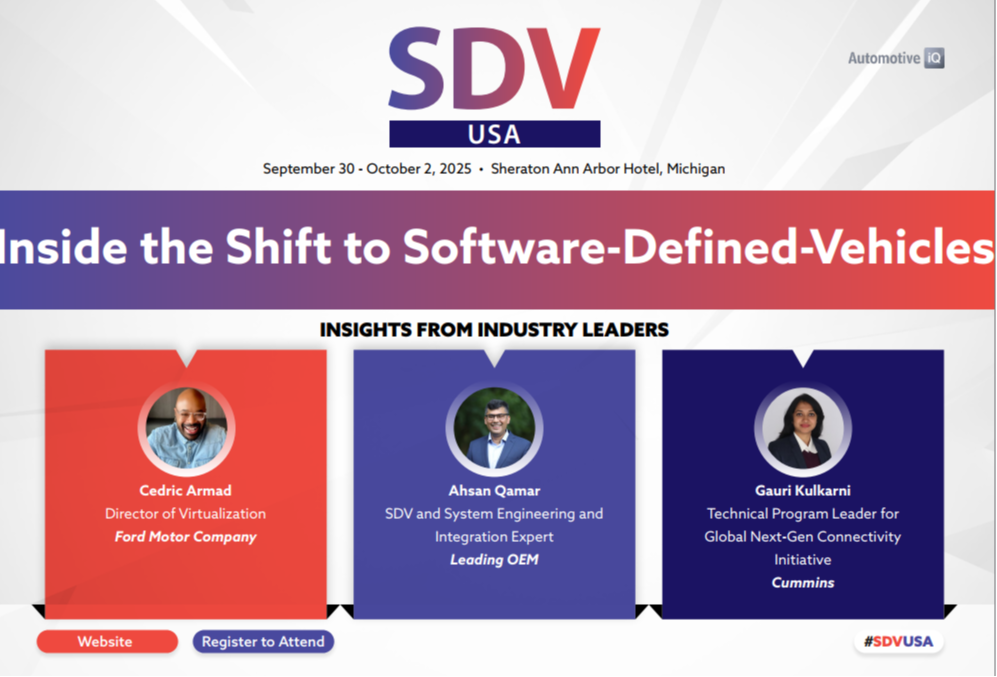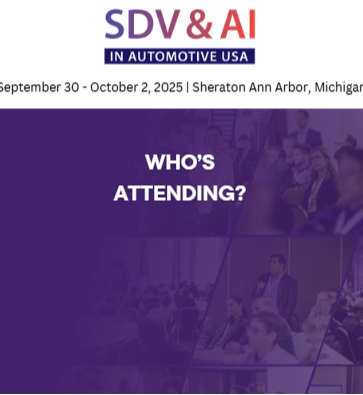Content Hub | SDV & AI in Automotive USA 2025
2025 Exclusive Insights

AI in Software-Defined Vehicles: What You Need To Know
Ahead of SDV & AI in Automotive USA 2025, Automotive IQ compiled a market report offering a detailed overview of how AI is transforming SDVs throughout their entire lifecycle, from development and testing to deployment and real-time operation. The report explores key AI technologies, applications such as autonomous driving and predictive maintenance, and examines critical challenges including cybersecurity, data privacy, and regulatory compliance.

Inside the Shift to Software-Defined-Vehicles | Insights from Industry Leaders
Automotive IQ recently interviewed Cedric Armand, Director of Virtualization at Ford Motor Company, Ahsan Qamar, SDV and System Engineering and Integration Expert at Leading OEM, and Gauri Kulkarni, Technical Program Leader for the Global Next-Gen Connectivity Initiative at Cummins, to discuss the shift to software-defined vehicles.
The piece includes:
- The Shift Embedded in Software Development - with Cedric Armand
- Quick-Fire Interview - with Ahsan Qamar
- Architectural Challenges in Software and Electronic Systems - with Gauri Kulkarni
They also share insights into what attendees can expect from their upcoming sessions at SDV USA 2025.

What's Next for AI-Powered Automotive Safety?
In this exclusive interview, Lakshmi Prasad Bhatta, Vehicle Safety Engineer at Mahindra Automotive, discusses how AI, machine learning, and Generative AI are transforming vehicle safety, particularly in autonomous systems.
Prasad highlights the critical role of sensors, machine learning, and Generative AI in enabling real-time decision-making, anticipating road hazards, and improving system resilience under complex driving scenarios. He also previews his upcoming session at AI in Automotive USA 2025, where he will explore the evolving role of Generative AI in predicting and preventing accidents in autonomous vehicles.

Iveco Group’s Strategy to Make Development Processes Compatible With Software-Defined Vehicles
In the rapidly evolving landscape of automotive technology, the shift towards Software-Defined Vehicles (SDVs) presents both challenges and opportunities. Iveco Group has been at the forefront of this transformation, leveraging innovative strategies and cutting-edge technologies to adapt its development processes and methodologies.
In this case study, Demetrio Cortese, Embedded Software Development Manager of Iveco Group explores how the organization is aligning with the SDV paradigm, emphasizing the critical role of simulation technologies, the balance between proprietary and open-source solutions, and the company’s overarching strategy to drive innovation and meet customer expectations.
- Simulation Technologies to Accelerate SDV Development
- Proprietary Solutions vs Open-Source Projects
- Revenue Generation, Cutting Costs, and Meeting Customer Expectations
- Standing Out in the Market
- Electronic Control Units (ECUs)
- Iveco Group’s Strategy to Align with SDVs

The Pivotal Roles of Generative AI to Optimize Automotive Design & Technology | Insights from ZEEKR’s Head of Design
Javier Garcia – Gallardo Mosquera, Head of ZEEKR Design Shanghai, speaks with Automotive IQ and sheds light on the pivotal roles of generative AI in optimizing automotive design and technology. Learn from Javier who discusses:
- Modernizing the vehicle design process
- Optimizing the design process: Faster, more efficient, and innovative designs
- Technical challenges
- Integration challenges from a processes and policies perspective and the solutions

Who's Attending SDV & AI in Automotive USA 2025? Early Attendee Snapshot
Take a look at who's attending SDV & AI in Automotive USA 2025 by downloading the early attendee list
Latest Insights - Software-Defined Vehicles USA

The Good, the Bad & the Ugly of Software-Defined Vehicles: Successes & Lessons Learned from a Former GM Professional Fellow, Technology Trends
Vehicles, as we know them are changing and getting completely overhauled. OEMs are facing a completely new paradigm where they are not only transforming a 100-year-old industry, but also trying to sell a new product which involves maintaining and updating it throughout its lifecycle. Companies are working hard but in a continuously evolving market, automotive companies are on a steep learning curve to deliver early versions of Software-Defined Vehicles (SDVs).
As the automotive industry continues to step toward a future defined by SDVs, Automotive IQ spoke with Partha Goswami, the Former Professional Fellow of Technology & Trends at General Motors. In this interview, Partha shares invaluable insights gleaned from his extensive experience in the automotive sector, offering a comprehensive overview of the challenges, successes, and future trajectory of SDV development.
Discussion highlights:
- General Motors’ SDV Journey
- Establishing and Overcoming the Challenges
- Generating Revenue from SDVs and Alternative Revenue Models
- Long-Term Viability of Fully Electric EVs and its Impact on SDV Adoption
- Staying Ahead in the Market Amidst Tesla’s Influence
Latest Insights - Generative AI for Automotive USA

The Potential of Generative AI to Optimise Product Development and Process Automation | Interview with Jörg Reichardt at Continental
Generative AI (GenAI) technology is disrupting the way vehicles are designed, manufactured, and experienced. There are ongoing talks and initiatives to break into and develop GenAI, a lot of bottom-up innovation taking place, and investment in the space is rising as new projects kick off. In this interview between Automotive IQ and Jörg Reichardt, Senior ML Expert at Continental, the topic of how technology is empowering automotive companies to optimise product, process and people efficiencies with generative AI is explored.
Interview highlights:
- The differences between GenAI vs. what was previously possible with machine learning, and why is it more powerful than before.
- How GenAI can improve results, performance, and impact of product development.
- Which automotive applications and business areas are most likely to benefit from GenAI.
- What type of training will be required to empower teams to use LLMs and GenAI models.

Optimising Vehicle Design Using Generative AI: Expand the Power of Vehicle Design & Improve Speed of Design Development | Sebastian Wienhold at ZF Group
As artificial intelligence continues to soar, opportunities for the automotive industry to optimise vehicle design with this technology have arisen. The application of Generative AI (GenAI) can be used to improve product design to include features that were previously not reachable. Sebastian Wienhold, AI Ambassador for Division R - Passive Safety Systems at ZF Group speaks with Automotive IQ to explain how this can be achieved.
Sebastian shares his expertise and perspectives on the implementation of generative AI techniques in both software and hardware design processes, as well as discussing optimising output, applying image generation models to vehicle design, unlocking new features, and navigating the intricate balance between design and engineering considerations.

Using Generative AI to Enhance the Development of Autonomous Driving: Learn from Data Scientist, Marcel De Sutter at a Leading OEM
Automotive IQ interviewed Marcel De Sutter, Data Scientist- Data & AI Lab, at a leading OEM, who gives a detailed insight into the transformative role of using Generative AI for the advancement of autonomous vehicles (AVs).
Marcel discusses how cutting-edge techniques, including Generative Adversarial Networks (GANs) and large language models, have optimised the development landscape. Exploring diverse applications across the spectrum of AV research and development, Marcel expands upon the instrumental contributions of generative models including data augmentation, perception enhancement, and mixed reality integration.
The interview discussions continue with the challenges and strategic considerations in deploying generative AI, shedding light on its pivotal role within the broader automotive industry. Marcel foresees a landscape where generative AI not only amplifies AV testing capabilities but also fortifies ethical and adaptive capacities in dynamic real-world conditions.
Sponsorship Enquiry

Who's Attending SDV & AI in Automotive USA 2025
Download the sample attendee list to find out who's attending SDV & AI in Automotive USA 2025



